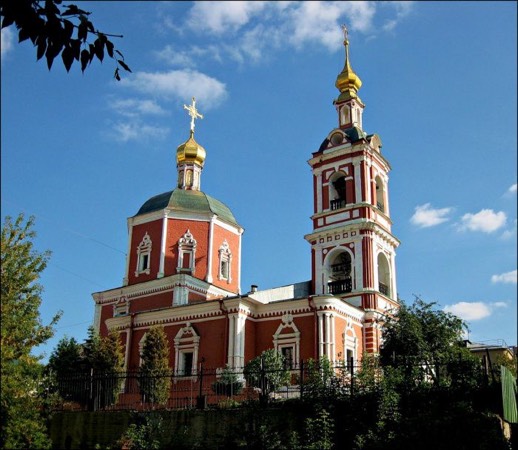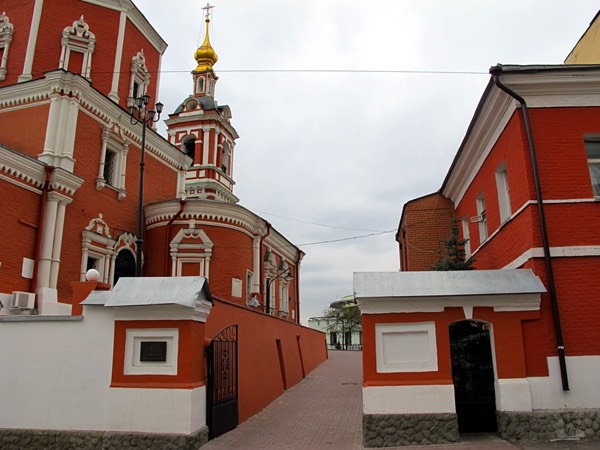Peter and Paul Church at Yauza Gates
Since ancient times, the location of the Church of the Holy Apostles Peter and Paul at the Yauza Gate was called Kulishki Here, near a small hill, popularly nicknamed Ivanovskaya Gorka, the Moscow River and the Yauza River merged together. The earliest mention of the stone temple located on Kulishki dates back to 1631.
As we know it, the Church of the Holy Apostles Peter and Paul has existed since 1700-1702. It was built at the behest of Patriarch Adrian of Moscow and All Russia. The main throne is consecrated in honor of the icon of the Mother of God “The Sign”. The throne of Peter and Paul was placed in another side chapel in the northern part of the church. Many years later, a side chapel for the Kazan Icon of the Mother of God was organized in the southern part. Since then, the church has become a three-altar church. If we talk about the architecture of the building, it is made in the style of Moscow Baroque. At that time, it was a symbol of Russian architecture of the late 18th and early 19th centuries, the very source of the development of Russian Baroque.
Over the years, the Church of the Holy Apostles Peter and Paul has undergone many changes. In 1748, a fire broke out in the building, after which it was soon possible to bring it into proper shape with the support of parishioners. Later, a three-tier bell tower was installed. The period of the Patriotic War passed relatively calmly for the church, but many priests were left homeless, and church buildings were partially destroyed.
During the Soviet period, many religious institutions were closed, but the Church of the Holy Apostles Peter and Paul managed to avoid this fate. After the revolution of 1917, opponents of the church increasingly visited here demanding transfer: representatives of the clergy who failed to defend their churches sought refuge here, and also hid shrines that need to be preserved.
In 1918, the government destroyed the metochion of the Serbian Church, which had existed for more than forty years. Three decades later, with the participation of Patriarch Alexy I, the Serbs were given a metochion in the Church of the Holy Apostles Peter and Paul, but due to interference from the authorities, they were unable to start working.
It was only in the late nineties that the church was transformed into the Patriarchal Metochion. Then the Serbian Church found refuge again. It took almost a hundred years to recover everything that was destroyed by the revolution. Today, the Church of the Holy Apostles Peter and Paul is a functioning church that symbolizes the unity of peoples and the indivisibility of the soul.
Address
per. Petropavlovsky, 4-6
Address
per. Petropavlovsky, 4-6
Address
per. Petropavlovsky, 4-6
Phone
+7 495 917-29-75
Phone
+7 495 917-29-75
Phone
+7 495 917-29-75
Website
Peter and Paul Church at Yauza Gates
Website
Peter and Paul Church at Yauza Gates
Website
Peter and Paul Church at Yauza Gates
Source
https://kudago.com/msk/place/hram-svyatyh-apostolov-petra-i-pavla/
Source
https://kudago.com/msk/place/hram-svyatyh-apostolov-petra-i-pavla/
Source
https://kudago.com/msk/place/hram-svyatyh-apostolov-petra-i-pavla/


